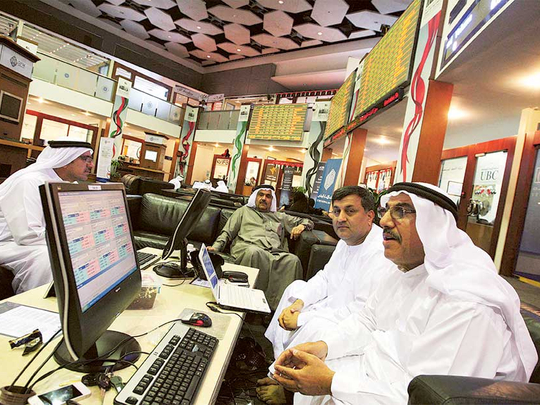
Dubai:
Equity investors in the UAE are likely to wait for stability in crude oil and its major equity indices before accumulating any stocks, which were considered as expensive before the recent fall.
On Sunday, the Dubai Financial Market General Index erased all of its gains registered in 2014, ending the trade 7.61 per cent lower at 3,321.33, its worst since October 2008.
However, outlook for equity markets would hinge on crude oil, which slumped 2.9 per cent to $61.85 a barrel in London on December 12, for the lowest close since July 2009.
“Dubai was considered expensive before the fall but now valuations are pretty attractive at current levels. Investors should look for stability before investing. It could be a good idea to start allocating money to the market for people who have some cash,” said Sebastien Henin, head of asset management at The National Investor.
Al Mal Capital official also agreed.
“The best advise today for clients with cash is to start accumulating as valuations are very attractive even with expected growth potential for 2015,” said Tariq Qaqish, head of asset management at Al Mal Capital.
“For clients who are fully invested hold and wait for the rebound. But both are advised to look at oil prices as a major factor that would influence regional stock market outlook,” said Qaqish.
Brent crude and WTI crude have collapsed about 20 per cent since November 26, the day before the Organisation of Petroleum Exporting Countries agreed to leave its production limit unchanged at 30 million barrels a day. Saudi Arabia, Iraq and Kuwait, the group’s three biggest members, this month deepened discounts on shipments to Asia, bolstering speculation that they’re fighting for market share.
Comfortable level:
“At these crude oil levels we don’t expect any ramifications for the GCC region. Crude at $60-65 is a very comfortable level and we don’t expect any fiscal austerity, with the exception of Oman,” said Jaap Meijer, managing director at Arqaam Capital.
However, it could be challenging if oil prices hit $50 a barrel.
“Outlook for non-oil GDP should be unchanged and price levels look very attractive with almost unchanged cash flows forecasts. Though if oil were to hit $50 that could change, with modest to substantial fiscal deficits in all GCC countries, with the current account deficit in Oman being most remarkable. It wouldn’t be unthinkable to see cuts in discretionary spending or delay in projects,” said Meijer.
Foreigners flee Emaar:
Most of the foreign investors have sold off Emaar Properties, analysts said,
“We are hearing that international players have started shorting Emaar post dividend, and that is causing the extent of the damage,” said an analyst who wished not to be named.
Emaar Properties will distribute the recently approved special cash dividend of Dh9 billion ($2.45 billion) on December 23. The special cash dividend will take the total dividend distributed in 2014 to Dh17.12 billion.
Emaar Properties, which has a weightage of 17 per cent on the Dubai index, fell 8.02 per cent to be at Dh6.65.











